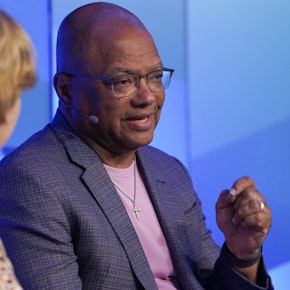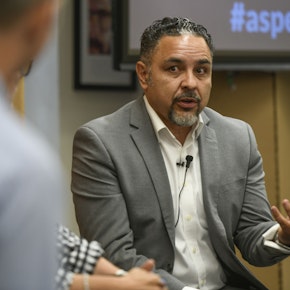Explore
Search results

Historically, globalization has been characterized by cross-border flows of resources and products. Financial exchanges follow, allowing for direct investment at home and abroad. In the digital economy, we see massive flows of information and data, which are perhaps even more critical to economic growth, crossing borders everywhere. In an era of anti-globalism, can the pac...

The United States and Germany have much in common: advanced industrial economies, high living standards, first-class universities, and leading companies. They also share the same pressures from globalization — trade competition, technological change, movement of people and ideas — around which to innovate and adapt. But the data makes it clear that Germany has better maint...

Each year, new technology transforms how we connect, how we move, and how we pay. But nearly two billion people remain “unbanked.” So do financial technology innovations decrease or deepen the divide between the have and the have-nots? As economies become increasingly digital, what are the stopgaps we need to deploy to protect and empower all? From crypto to credit to port...

The impact of A.I. on the job market is debatable, as it has the potential to both automate tasks and displace workers but also the potential to create new economic opportunities and enhance productivity. How do workers, employers, and educators need to prepare for this brave new world?

Join Jim Farley as he explores how drivers' needs and priorities are guiding the future of vehicle technology and reshaping our expectations of cars and trucks.

After decades with no significant geopolitical rivals, the United States now faces the emergence of China as a major adversary. How will this change the landscape of the emerging world order? What new forms of geopolitical conflict will arise, and what new forms of cooperation are necessary?

While internet connectivity, technology, and digital skills are central to every part of modern life, the unfortunate reality is that millions of Americans have been left behind. We’ll discuss how transformational investment in digital equity and inclusion is helping close the digital divide.

The recent frenzy around NFTs and cryptocurrency have thrust blockchain into the spotlight. But is the true promise of the technology more profound? Joe Lubin, co-creator of Ethereum and one of the original pioneers in blockchain, joins Financial Times’ Gillian Tett to discuss the state of cryptocurrency and the implications of decentralization for the global economy.

Within our lifetimes, AI will, by design, begin to behave unpredictably, thinking and acting in ways which defy human logic. Big tech companies may be inadvertently building and enabling vast arrays of intelligent systems that don't share our motivations, desires, or hopes for the future of humanity. Is it too late to change course and realize a human-centered future for a...

Attracting, developing, and retaining talent has been a hallmark of American economic strength for decades. However, in the first decades of the 21st century, the combined impacts of recession, slow recovery, and globalization on some sectors alongside rapid advances in technology in others is challenging our ability to keep our workforce current with the demands of the la...

Technologists and reputable research now predict a huge potential for disruption in jobs as the pace of technology accelerates. Canada, Finland, the Netherlands, GiveDirectly, and Y Combinator are all proposing experiments in a Universal Basic Income (UBI) as an answer, but American politicians are silent. This session will explore why UBI is the right future economic poli...

Time to start listening to the growing set of young entrepreneurs who are actually making things in America — they might be driving a renaissance in manufacturing right here at home. How is this possible? Technology makes design and production more efficient now, labor is available, and yes, governing principles stand for a lot. For many young leaders, “making it in the US...

Financial-technology innovation is accelerating globally, making financial services more affordable, convenient, and secure for individuals and businesses. Billions of people — and entire economies — stand to benefit from this transition, but more work must be done to unlock the full potential of these innovations. What is fintech’s role in driving inclusive economic growt...

If young adults need a college education so badly, why are recent college grads so disproportionately unemployed? Experts tell us that two-thirds of jobs in the US by 2020 will require post-secondary credentials of some sort. Ironically, the pace of change is such that identifying the jobs that will come available in five years is hard to predict, creating questions ab...

Poverty is a powerful stressor that influences growth and development in children, and physical and mental health throughout adulthood. Science and imaging technology are making its impact visible, demonstrating how the socioeconomic disparities that flow from historical injustice alter brain structures. We’re also learning that social capital can be a protective layer aga...

Globalization ushered in an era of free trade, fluid borders, and unparalleled corporate profits. For its proponents, the global integration of states and their economies was a political and economic win that created a wealth of opportunities for workers and consumers around the world. But in the United States, jobs are disappearing in construction zones, clerical offices,...

Semiconductors are the brains powering essential technologies. A shortage is hammering industries ranging from automotive to consumer electronics to equipment makers, making clear how critical semiconductors are to American economic competitiveness and national security. But the US share of global semiconductor manufacturing stands at just 12 percent today, down from near...

The spread of free enterprise has created a more dynamic, efficient, and competitive global economy, while the marvels of American technology and innovation have ushered in an age of unprecedented possibility. Where many business leaders worry about the increasing pressure for short-term profits, many in our workforce worry that the lack of training, limited benefits and u...

The economic prosperity of the United States of tomorrow depends in large part on how we invest in human capital today. It’s not news that to continue to compete, we need a workforce that is better educated, more technology-driven, and global. Who will be the engines of future economic growth and what are we doing to capitalize on their momentum? While much attention is be...

The lane for healthcare is widening. Well-capitalized retail and technology companies are pushing services out of the clinic and into big-box stores, corner shops, and private homes. While they are out purchasing computers and clothing, shoppers can also schedule their check-ups, dental care, mental health counseling, and X-rays. Meanwhile, tech companies are reaching clie...

